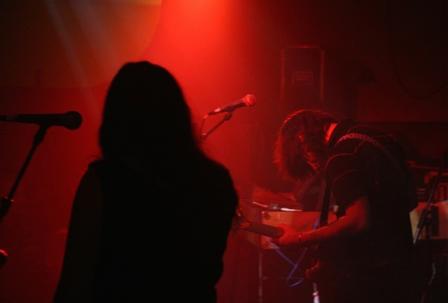When my midwinter rock and roll caravan left Tennessee’s upper Cumberland region for the mountains of western North Carolina, certain synergisms of my nearly monastic mission were not lost on me. Black Mountain, the visionary Vancouver quintet that was the expressive object of my expedition, shares its memorable moniker with the venerated locale of Black Mountain, North Carolina – a destination some six decades ago for the burgeoning intellectual and artistic avant-garde. Knowing that while in Asheville I would consume indie-rock’s most recent recycling effort of seventies psychedelia gave me pause as I pondered what Black Mountain College’s anti-musician John Cage might have said about a sound so expansive and massive, so downright song-like.
John Cage was post-rock before rock started really rocking – but I digress. We’ve been without Cage for more than fifteen years. And with the current rock scene so caged by its Pitchforkist pretensions, it’s sometimes difficult to ride the shamelessly spirited ascension offered by a band like Black Mountain without feeling a little ashamed. Isn’t this the “stoner” sound that everything from punk to hip-hop to electronic dance music once reacted against? Why does the current prog revival inspire us to not only dig bands like Black Mountain or The Mars Volta but also listen to the likes of vintage Rush, Yes, and Genesis with new ears?
With five members who share several overlapping side-projects under a larger collective umbrella, Black Mountain are currently traversing the United States in support a defiantly and ironically titled sophomore effort called In The Future. Like the band’s self-titled debut that instantly invoked comparisons to Black Sabbath, the feverish follow-up plumbs the depths of rock’s timeless recipe for skin-tingling religiosity, dishing out equal doses of heartfelt insurrection, hefty imagination, and heady intoxication.
Kicking open with the rugged sludge of “Stormy High” and sailing on the “Wild Wind” all the way until the memorable and engine-cooling coda of “Night Walks,” In The Future is best understood as a rite (or recording) of passage for the protagonists and the audience. In a revolutionary and spiritual sense, Black Mountain brought us this piece of sacred plastic to reclaim and epitomize the project pioneered and lost by progressive rock: album as quest. For some artists, such sonic excursions lose something when transposed onto the breathing palette of a packed club. But when the crowded house was Asheville’s Grey Eagle on a mid-February Saturday, the musical mood expanded rather than contracted.
With his wizardly mane and classic rock mannerisms, I almost mistook McBean for another messianic frontman. While I imagined him flying past the setting sun like a heavy metal Harry Potter rescuing the hippogriff Buckbeak from authority’s axe, McBean is a team player in when it comes to confronting the culture’s “Evil Ways.” But Jeremy Schmidt’s organs and synths kept the groove thing thoroughly deep, and Joshua Wells pounded the skins to ground out the whole thing in tribal thunder. All five fueled this juggernaut of jagged epiphanies, with co-vocalist Amber Webber occupying center stage.
Even with her soulful, Grace Slick-styled testimonials, Amber Webber is not much more your stereotypical frontwoman than McBean is frontman. Hiding behind her long brown hair, not wearing any make-up, and sporting a casual, purple hippy smock, the unassumingly gorgeous Webber willed our wonder with her otherwordly wails. On “Queens Will Play,” she disarmed the “demons” that “may be hiding in our shadows,” shining feminine force into the epic battle for an authentic aural revelation. When their voices teamed up later in the set for “Stay Free,” the open-hearted majesty mingled awe-inspiring tingles with something mellow to prepare us for the freak-out to come.
Even though the album achieves lift-off from track one and the live show is no different, when the wicked, hypnotic symphony of “Bright Lights” closed the main set, the band stretched a 17-minute brain-bender to nearly half an hour. Taking the trippy train to its destination of transformation, McBean’s guitar riffs and Schmidt’s Mellotron doodles went on and on and on. And I was still sad when it ended!
Black Mountain achieves the transcendent communal bliss that great rock has always aspired to, but does so in a delicate and modest manner. Blending laid-back Canadian manners that match the almost lazy spaced-out sounds, the five members can seem almost criminally shy onstage. Never engaging in any chatter or banter with the audience, this lack of stage presence could be easily misunderstood. But combined sounds are anything but shy, and I ultimately saw the band as rockers yet to be contaminated with too much rockstar baggage.
But in person, they’re entirely approachable. After the gig, the band members sipped Coronas and greeted fans by the stage. Webber laughed, chatted, and clinked bottles with Cortney Shanks, bassist and vocalist for the opening band, Blood on the Wall.
I felt inspired to inquire some about the band’s social conscience. Sensing lyrical echoes of Willliam Blake or Allen Ginsberg on “Tyrants,” where the words decry wars and the chickenhawks who wage them, I had to ask McBean about the song’s rhetorical prescience. Was it written about George Bush? “Not really,” he replied. But after a pause, he confirmed my interpretation – because reality’s story “worked out that way.”
While we know that name-checking is the both the bane of – and mainline fix for – rock writers everywhere, this crew doesn’t seem to mind the many comparisons. As I rattled off a list of some of rock’s more fabled poets that I saw in him, McBean flashed me a sly, sheepish smile before corroborating the traces of Dylan’s influence I’d detected in his songwriting.
Black Mountain’s momentum as a live band takes something so sacred and solitary when injected by headphones and translates it for the fuzzy heyday of open fields of frolic and spacious stadiums of the mind. More renovation than regurgitation, the music mounts the mythic towers of epic everything to proclaim the future, coming full circle until the future is the past – a promising, while problematic, prognosis that could only be reached through this witchy brew of badass prog gnosis.
Image credit: “Black mountain” by vern., used under Creative Commons license.











